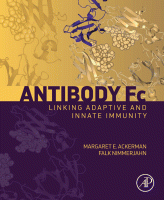Browse content
Table of contents
Actions for selected chapters
- Full text access
- Book chapterNo access
Index
Pages 359-363
About the book
Description
Antibody Fc is the first single text to synthesize the literature on the mechanisms underlying the dramatic variability of antibodies to influence the immune response. The book demonstrates the importance of the Fc domain, including protective mechanisms, effector cell types, genetic data, and variability in Fc domain function. This volume is a critical single-source reference for researchers in vaccine discovery, immunologists, microbiologists, oncologists and protein engineers as well as graduate students in immunology and vaccinology.
Antibodies represent the correlate of protection for numerous vaccines and are the most rapidly growing class of drugs, with applications ranging from cancer and infectious disease to autoimmunity. Researchers have long understood the variable domain of antibodies, which are responsible for antigen recognition, and can provide protection by blocking the function of their target antigen. However, recent developments in our understanding of the protection mediated by antibodies have highlighted the critical nature of the antibody constant, or Fc domain, in the biological activity of antibodies. The Fc domain allows antibodies to link the adaptive and innate immune systems, providing specificity to a wide range of innate effector cells. In addition, they provide a feedback loop to regulate the character of the immune response via interactions with B cells and antigen-presenting cells.
Antibody Fc is the first single text to synthesize the literature on the mechanisms underlying the dramatic variability of antibodies to influence the immune response. The book demonstrates the importance of the Fc domain, including protective mechanisms, effector cell types, genetic data, and variability in Fc domain function. This volume is a critical single-source reference for researchers in vaccine discovery, immunologists, microbiologists, oncologists and protein engineers as well as graduate students in immunology and vaccinology.
Antibodies represent the correlate of protection for numerous vaccines and are the most rapidly growing class of drugs, with applications ranging from cancer and infectious disease to autoimmunity. Researchers have long understood the variable domain of antibodies, which are responsible for antigen recognition, and can provide protection by blocking the function of their target antigen. However, recent developments in our understanding of the protection mediated by antibodies have highlighted the critical nature of the antibody constant, or Fc domain, in the biological activity of antibodies. The Fc domain allows antibodies to link the adaptive and innate immune systems, providing specificity to a wide range of innate effector cells. In addition, they provide a feedback loop to regulate the character of the immune response via interactions with B cells and antigen-presenting cells.
Key Features
- Clarifies the different mechanisms of IgG activity at the level of the different model systems used, including human genetic, mouse, and in vitro
- Covers the role of antibodies in cancer, infectious disease, and autoimmunity and in the setting of monoclonal antibody therapy as well as naturally raised antibodies
- Color illustrations enhance explanations of the immune system
- Clarifies the different mechanisms of IgG activity at the level of the different model systems used, including human genetic, mouse, and in vitro
- Covers the role of antibodies in cancer, infectious disease, and autoimmunity and in the setting of monoclonal antibody therapy as well as naturally raised antibodies
- Color illustrations enhance explanations of the immune system
Details
ISBN
978-0-12-394802-1
Language
English
Published
2014
Copyright
Copyright © 2013 Elsevier Inc. All rights reserved.
Imprint
Academic Press
